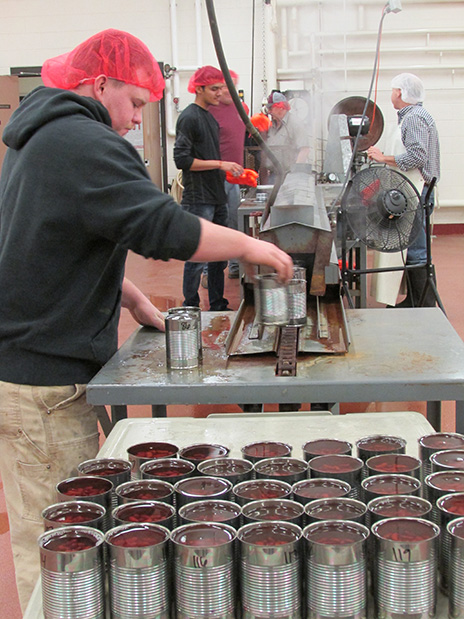UNIVERSITY OF WISCONSIN River Falls
Newsroom
Photo: Students and staff work
at canning kidney beans in the fruit and vegetable processing plant at
UW-River Falls. Chippewa Valley Bean has partnered with UW-River Falls
for 20 years to assess the canning quality of kidney bean lines under
development. UW-River Falls photo by Laura Walsh.
UW-River Falls and Chippewa Valley Bean celebrate canning anniversary
February 23, 2017 -- An anniversary was celebrated on campus earlier this month with the traditional congratulatory cake and the not-so-traditional can of kidney beans. For 20 years, Chippewa Valley Bean (CVB) has partnered with the University of Wisconsin-River Falls to assess the canning quality of kidney bean lines under development.
CVB has specialized in growing, processing and marketing kidney beans since 1973. This family owned and operated company, based in Menomonie, is the largest processor and exporter of dark red kidney beans in the U.S., handling about 35% of the total dark red kidney beans produced in the U.S. Over the past several years CVB has grown their exports from 25% to 65% of all sales. In 2015, the company was honored with the Governor's Export Achievement Award.
In 1981, CVB started their own breeding program, relying on non-GMO technology to develop kidney bean varieties with improved genetic resistance to root rot, white mold and various blights. As new varieties are being developed, they need to be tested for canning quality. It is these potential new varieties that CVB brings from their research plots to the fruit and vegetable processing plant at UW-River Falls.
The small-scale canning line in the processing plant, while old, is still well suited for a project like this. Once canned and allowed to sit for a specified period of weeks, the cans are opened and the beans evaluated. Product appearance is critical for canned beans. Canning companies will reject beans that split, crack, break or otherwise fail to meet quality standards.
"It is very gratifying that the department has been able to contribute to the product development needs of a company such as Chippewa Valley Bean," said Gary Onan, chair of the Animal and Food Science Department at UW-River Falls. "Ongoing collaborations with the food processing companies such as this long-standing relationship are one of the reasons that UWRF has been able to provide high quality food science education both in the past and now again with a new restructured program."
The fruit and vegetable processing plant is one of three pilot plants at UW-River Falls, along with the dairy and meat plants. These facilities support coursework in the food science and technology major and related programs, allow students to gain practical experience through employment opportunities, and offer settings for continuing education workshops for professionals in the food industry.
The UW-River Falls Dairy Plant is in the predesign phase of a renovation anticipated to take place in 2018. Once this renovation is complete, attention will turn to the Fruit and Vegetable Plant and the redesign of that space. A small-scale fruit and vegetable plant is important to Wisconsin, which ranks second in the nation in terms of total production and value of production for the major processing vegetables (corn, green beans and peas). Together, specialty crop production and processing accounts for more than $6 billion in economic activity or approximately three percent of the overall economy in the state.












